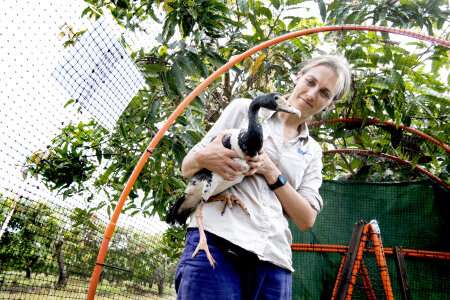Latest research finds magpie geese resist allure of NT mango madness

Research from Charles Darwin University (CDU) has identified opportunistic feeding behaviors of magpie geese across the Top End, with new solutions to improve management of the iconic bird as the Territory heads into peak mango season.
Magpie geese are protected wildlife and a symbolic animal in the Northern Territory , but they can also pose a challenge to local agriculture as they feed on seasonal crops and cause financial losses.
Dr. Amélie Corriveau from the Research Institute for Environment and Livelihoods found that magpie geese consume crops when there is an opportunity to, rather than specifically seek out farms for optimal food sources.
"We used DNA metabarcoding to identify the contents of magpie goose diets and understand how the birds are feeding across the Greater Darwin region," Dr. Corriveau said.
The lead author's latest study was published this month and investigated the relative contribution of agricultural and natural food sources to goose diet during the Top End's late dry season.
"Their diets contained both natural plant food sources, and agricultural crops like mangoes. The geese don't necessarily target mangoes, but rather farms are located within their seasonal feeding grounds."
The pervasive problem of conflicting feeding grounds expands across the Top End.
"Magpie geese tend to return to the same general areas in the Top End each year, so working with local farmers and environmental authorities to understand feeding behaviors could reduce the impact on peak season crops and improve species management," she said.
"Farmers could minimize the appeal of their fields with shorter grass or alternative ground cover. On the other hand, providing more protected nature reserves as alternative foraging areas could benefit the long-term conservation of geese, while possibly reducing the pressure on valuable crops."
Dr. Corriveau's colleague Professor Stephen Garnett said the research shows a deeper understanding of magpie goose feeding behaviors to aid joint conservation efforts.
"Amelie's work is important because it shows that the mangoes are not essential to the geese, even though they like them," Professor Stephen Garnett said.
"That means taking mangoes off the goose menu will do the geese no harm. It also means that there is real potential to reduce conflict between the geese and farmers, if the geese are managed cooperatively across the rural landscape."
The research was published in the Journal of Applied Ecology.
More information: Amélie Corriveau et al, Using dietary metabarcoding analyses to characterise waterbirds–agriculture interactions, Journal of Applied Ecology (2022). DOI: 10.1111/1365-2664.14272
Journal information: Journal of Applied Ecology
Provided by Charles Darwin University




















